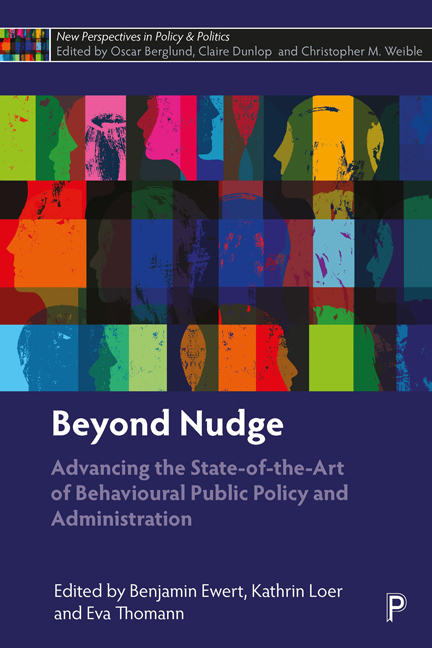Book contents
- Frontmatter
- Contents
- List of figures and tables
- Notes on contributors
- Acknowledgements
- 1 Beyond nudge: advancing the state-of-the-art of Behavioural Public Policy and Administration
- 2 Advancing behavioural public policies: in pursuit of a more comprehensive concept
- 3 A behavioural model of heuristics and biases in frontline policy implementation
- 4 Who are behavioural public policy experts and how are they organised globally?
- 5 Why nudge sometimes fails: fatalism and the problem of behaviour change
- 6 Behavioural insights teams in practice: nudge missions and methods on trial
- 7 Can street-level bureaucrats be nudged to increase effectiveness in welfare policy?
- 8 What motivates street-level bureaucrats to implement the reforms of elected politicians?
- 9 How can better monitoring, reporting and evaluation standards advance behavioural public policy?
- 10 Conclusion
- Index
3 - A behavioural model of heuristics and biases in frontline policy implementation
Published online by Cambridge University Press: 28 March 2024
- Frontmatter
- Contents
- List of figures and tables
- Notes on contributors
- Acknowledgements
- 1 Beyond nudge: advancing the state-of-the-art of Behavioural Public Policy and Administration
- 2 Advancing behavioural public policies: in pursuit of a more comprehensive concept
- 3 A behavioural model of heuristics and biases in frontline policy implementation
- 4 Who are behavioural public policy experts and how are they organised globally?
- 5 Why nudge sometimes fails: fatalism and the problem of behaviour change
- 6 Behavioural insights teams in practice: nudge missions and methods on trial
- 7 Can street-level bureaucrats be nudged to increase effectiveness in welfare policy?
- 8 What motivates street-level bureaucrats to implement the reforms of elected politicians?
- 9 How can better monitoring, reporting and evaluation standards advance behavioural public policy?
- 10 Conclusion
- Index
Summary
Introduction
This chapter proposes a novel framework for the influence of heuristics and biases on the allocation of resources and sanctions by frontline workers. Under the heading of ‘Behavioural Public Administration’ (BPA), scholars increasingly engage in ‘the analysis of public administration from the microlevel perspective of individual behavior and attitudes by drawing on insights from psychology’ (Grimmelijkhuijsen et al, 2017). We focus on frontline workers, also called street-level bureaucrats or policy professionals, who are involved in either the delivery of public services, for example welfare or education providers, or the allocation of sanctions, such as police officers or inspectors. Street-level work entails direct social interactions with policy target groups, or clients, such as welfare applicants, students, car drivers, or farmers. Clearly, this interaction is not merely a rational, technocratic process. Yet, the ‘human factors’ that characterise these processes remain remarkably undertheorised (Winter, 2012; Saetren, 2014).
Frontline workers ‘cope’ with work demands that typically exceed the limited time and resources available to them (Lipsky, 1980; Maynard-Moody and Musheno, 2000; Tummers et al, 2015 a, b). In such a context streetlevel bureaucrats use heuristics and biases to aid decision-making (Jilke and Tummers, 2018; Harrits, 2019). Accordingly, the policies ‘in action’ can diverge significantly from the policy ‘on paper’ (Gofen, 2014). BPA-inspired research has undoubtedly fostered progress in our understanding of the micromechanisms that drive frontline policy implementation (Grimmelijkhuijsen et al, 2017; James et al, 2017). For example, inspectors have different ‘styles’ of enforcing public policies (May and Wood, 2003; Rutz et al, 2017; de Boer, 2018; de Boer et al, 2018). Or, frontline workers can feel ‘alienated’ from the policies they should implement (Tummers, 2011; Loyens, 2015; Thomann et al, 2018b). Frontline bureaucrats’ actions may be influenced by the extent to which they share the political ideologies of their principals (Lee and Park, 2020). However, the full potential of behavioural insights to explain streetlevel behaviour including direct impacts on clients has not yet been exploited.
Frontline workers who put democratically decided upon public policies into practice have more direct social impact than other bureaucrats: citizens usually have their most direct experience with ‘the state’ through them.
- Type
- Chapter
- Information
- Beyond NudgeAdvancing the State-of-the-Art of Behavioural Public Policy and Administration, pp. 44 - 66Publisher: Bristol University PressPrint publication year: 2023

